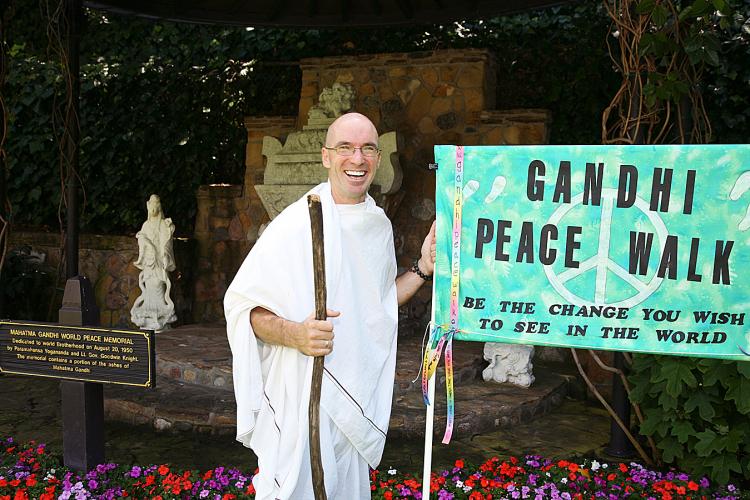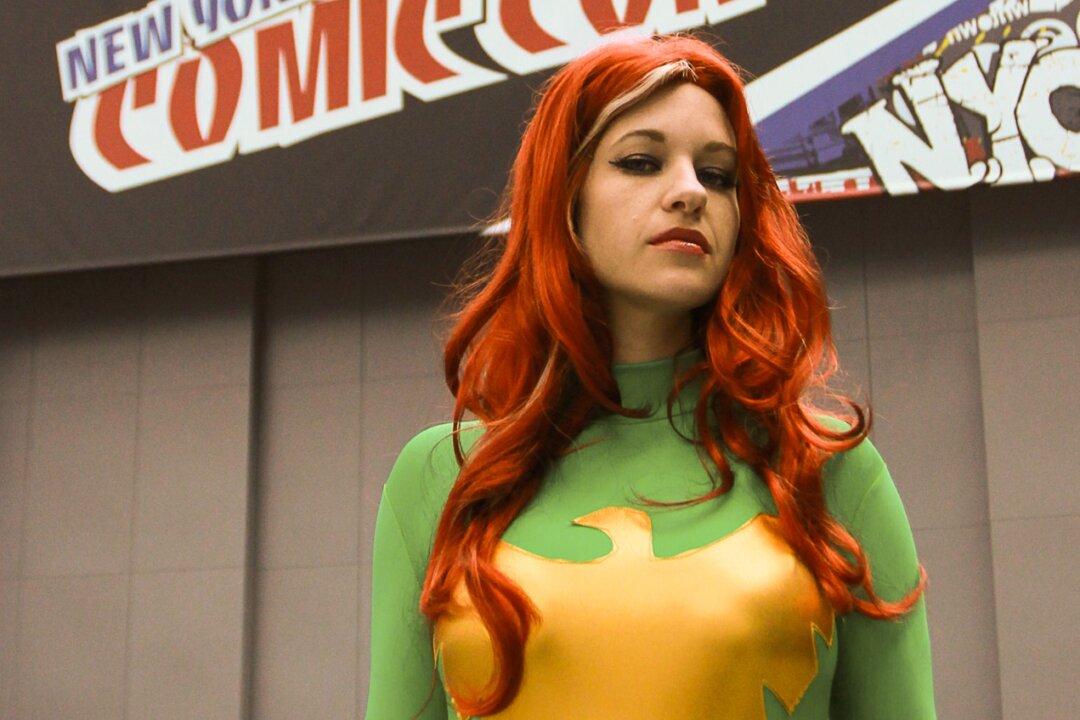Dermot Butterly, a 40-year-old Irishman who now resides in Malibu, California, has begun a personal mission to spread peace across America one person at a time.
Dermot says, “Anything to promote peace, my friend. I’ll do anything.” He continues, “Every minute of every day. That’s what the walk is about. It’s about creating peace.”
Dressed as Mahatma Gandhi, who was a major political and spiritual leader of India and a role model for millions, Dermot walks between 15 and 20 miles a day on a quest for peace, from one coast of America to the other.
Why does he do it?
He says, “The purpose of the Gandhi peace walk is to inspire more peace in the world, and also to build an eco-center for an impoverished village in India.”
His goal is to raise $30,000 to help build an eco-friendly school, hospital, and training ground for the people of Soro Village, located in one of the poorest states of all of India, and one recently ravaged by floods.
Can one person really make such a difference?
“People say this to me all the time,“ he replies. ”And I simply say to them, to quote Peace Pilgrim, ‘There are many small things to do in the world, and I’ll start there.’ I believe one person can make a difference.”
When asked if he believed this before he started to walk, he said, “No. Absolutely not. When I started this walk I didn’t think I could do it. I didn’t think I could finish it. I thought I wasn’t strong enough. I didn’t know where the money was going to come from. I didn’t know how I was going to do it. I didn’t know anything. And I was so scared that I backed out of it a few times.”
But a friend of his said, “Dermot, I think you can do it.” They created a short movie about the journey, its purpose, and Dermot himself. “And when we made the movie and I looked at it, I said, ‘OK, I think I can do this!’”
Some may think it’s simply impossible to drop everything and start walking. What about our jobs, our family, our bills that need to be paid?
“I had all that too,” he replies. “I was taking care of a house in Malibu, free rent, the whole lot. I let it go. I said, ‘OK, maybe I’ll get it back, maybe I won’t.’ But I let it go.”
How can people let go to such an extent? His belief is: “We just gotta trust. Ask for what you want, and trust that you’re going to get it. But most of us don’t. Most of us ask for what we want and then we go out and try to make it happen, as opposed to just trusting that it will happen. And that’s a lesson that I’m learning every day.”
Mr. Butterly goes on to say, “I’m not perfect, but I put myself in a situation with this walk, where I can either try and control everything, or simply let go.”
Letting Go
During the first four months of the journey he tried to control every aspect of the path, meticulously planning all the details, routes, meals, supply pickups, and so on, but the more he walked the more he realized he wasn’t in control.
“[Trying to control] everything just didn’t work. I made myself sick, tired, had headaches, stress, you name it, everything.” He says he reached a point where he felt, “I just got too much one day and I broke down crying, ‘I can’t do it. I can’t do the walk like this, I’ll have to do it another way, because if I don’t let go I’m just not going to finish it.’”
So now, at the start of each day, he simply says a prayer to “be of service to whoever I come into contact with today,” and goes on his way, never knowing what will come next.
“Change is constant,“ says Dermot. ”And who we are is always changing, whether we want to admit it or not.” His advice: “The best thing we can do is go with it. Go with the flow. To quote one lady I met, she said, ‘Drop the oars and go with the flow.’ That’s the best thing you can do in life.”
How does he know when he’s going with the flow? “When we’re peaceful, when we’re joyful, happy, loving, compassionate, all those things,” he answers.
“I think it’s easy for anyone to know when they’re not in the flow. The question becomes, ‘What are you going to do to get back into the flow?’”
As a result of this walk, Dermot now believes that the more one lets go, the more one receives. “And then, things show up. Places show up, people show up, food shows up, money shows up, clothes show up.” The more he walks, the closer and more connected he feels with the spirits of Gandhi and Paramahansa Yogananda, the one who originally initiated Gandhi into the spiritual practice of Kriya Yoga.
Listening to the Silence
As he walks across vast stretches of land, with no one else in sight, he begins to understand just how loud our lives can really be, both externally and internally, amidst the constant chatter of the mind.
“Monday is also my silent day. I don’t talk, I don’t listen to any books, or my iPod. I put in ear plugs and I spend the day in complete silence. Just to be quiet, you know? To switch my mind off.”
In these moments of silence, where the usual current of life is flowing, if this stops, what takes its place?
“Quietness,” he says. “Silence. And within that silence is, of course, peace. Where I find my peace.”
Making a Difference
Traveling up to 20 miles a day by foot, Dermot can often wait two to three hours on a road in the middle of nowhere, at night in the cold and dark, for a ride back to his supply truck. He then drives the truck to where he took his last step and continues the journey the next day. Oftentimes he’ll have interesting conversations with those he meets.
“I started having these conversations with the people that were picking me up. And I really feel I inspired a lot of people through that, just by talking with them.” Some people, he said, contact him via e-mail later on to give thanks for listening and for being there in their time of need.
In one chapter of his journey, Dermot walked into a gas station in a small town in Texas, and came across three teenage boys as well as farmers and residents of the town. They asked what he was doing and he said, “I’m doing a peace walk across the country.”
The boys were very surprised. They had never left the town before, and were shocked to see an Irishman dressed as Gandhi talking about peace, especially about a new way of looking at life.
“I spoke to them all about peace and primarily about thought, word, and action. That’s one of the principles of Gandhi’s messages. ‘We must be the change we wish to see in the world.’”
How then, can we be the change? Using Gandhi’s words, Dermot replied, “You be the change by changing your thought, your word, or your action to whatever specific outcome that you want.”
He says that during his conversation with the boys, they began to see that there are certain factors in life that we are responsible for. The eldest boy in particular wanted to improve his relationship with his father, but did not know how, and blamed everything on his father. They spoke for several hours.
A few minutes after their conversation ended and Dermot had continued along the road, the boy came running up to him and said, “I’ve never heard anyone speak the way you spoke today. I’ve been praying for help in my life, with my father. Thank you, you’ve inspired me. I believe this day is a miracle.”
Dermot asks himself, “Have I changed the world, and done anything huge? No. Have I made a difference in a few people’s lives? Absolutely, no question about it. Have I made a huge difference in my life? Absolutely!”
And what about his goal to create more peace in the world? He answers, “Yes, because I’ve created more peace in myself. So there’s more peace in the world. Peace is an inside job. Change is an inside job. It all starts from the inside.”
‘Whatever it takes’
Dermot Butterly’s walk across America will travel from California, to Arizona, New Mexico, Texas, Oklahoma, Arkansas, Tennessee, and onward to Washington, D.C., where he will attend a peace conference and concert on April 15.
But what if he doesn’t earn all the money needed for the village in India by the time he reaches the White House?
“Well, if I don’t make the money within the allotted walk time,“ he says, ”I’ll come up with another idea. [laughter] I’ll basically do whatever it takes, mate, to get that $30,000! [loud laughter] And that is the truth. If I have to walk back, I’ll do that too! I don’t care. I’ll do whatever it takes. I signed on to raise this money and that’s what I’m gonna do.”
His message to all those who read this article, is: “Follow your bliss. Do whatever is in your heart that you know you should be doing. Ask yourself, ‘What can I do? What do I want to do?’ Then OK, do it.”
Though all journeys must come to an end, let us hope that Dermot’s message, like Gandhi’s, will be far reaching and everlasting.
For more information about Dermot Butterly’s walk across America as Gandhi, or to contact him directly, please see http://gandhipeacewalk.org/







